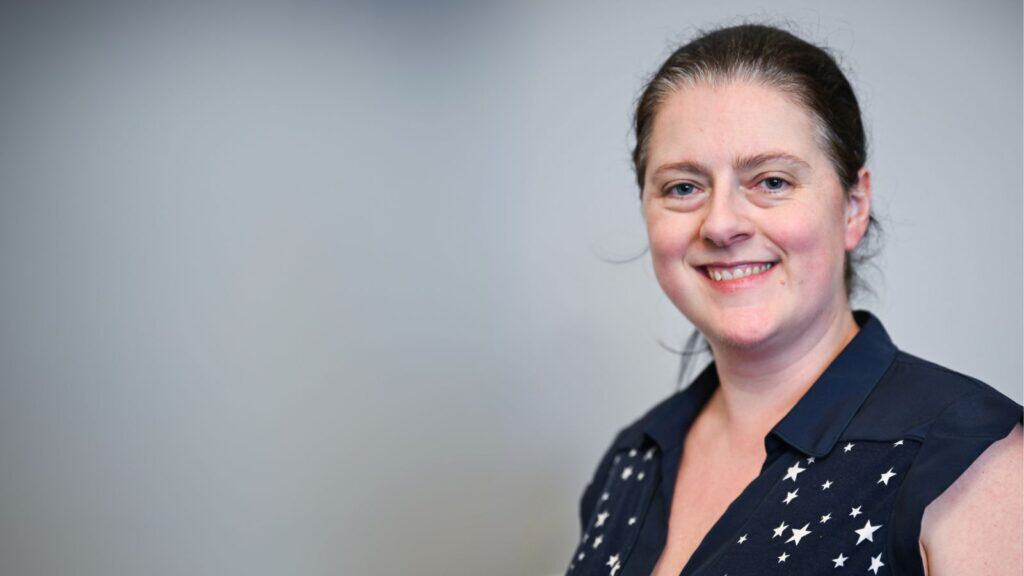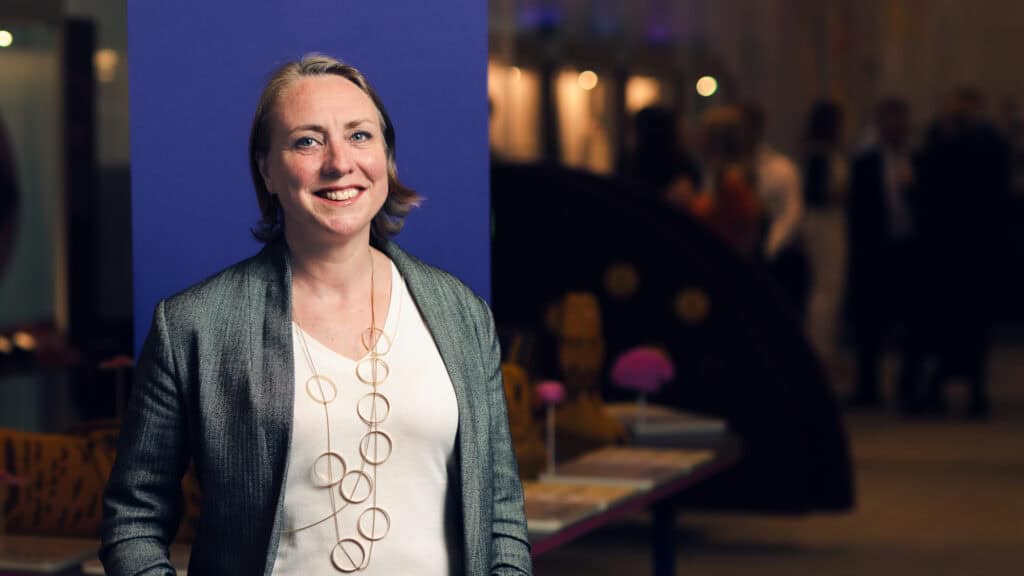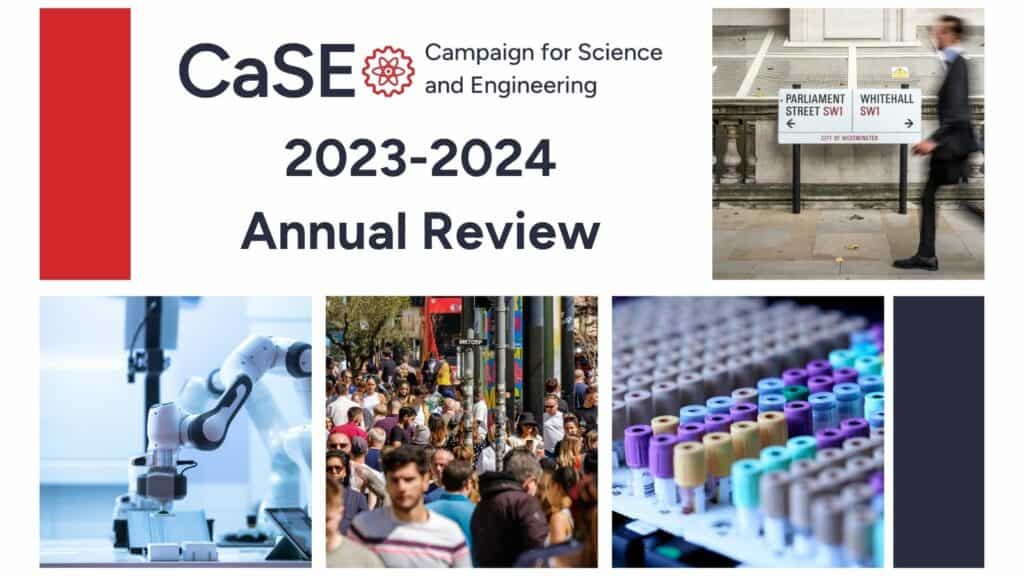Executive Director Dr Sarah Main gives her report on CaSE’s activities at the 2019 AGM on 26 November 2019, hosted by the Geological Society
CaSE in 2019 – a look back and a look forward
03 Dec 2019
Welcome and thank you for coming. It’s wonderful to see so many of you here.
Introduction
The Campaign for Science and Engineering exists to try to make the environment in the UK as favourable as possible for science and engineering. Our mission is to ensure the UK has the skills, funding and policies to enable science and engineering to thrive. We have a growing membership that supports us in that mission: around 600 individuals and one hundred and nineteen organisations, twelve of which are new to us this year, from across academia, industry, learned societies and research charities. Those organisational members collectively employ over 330,000 people in the UK and, of those, our industry and charity members invest around £33bn a year globally in R&D. Thank you to all of you for your support: your encouragement, input, evidence, guidance and collaboration.
Before starting this speech, I looked back at what I said last year. At the end of my director’s report to the AGM in 2018, I said, “In the year ahead, my goals for CaSE will be to use our voice for the rich ecosystem of science and engineering in the UK with courage, with relevance and with others.” Why? Because, having reflected on the political turbulence of that year and the importance of issues on the national agenda to science and engineering, I concluded that, to cut through the clamour, and to get traction, “we must keep a cool head, stay focussed on the science and engineering interest in these debates, and work together.” You must be the judge of whether or not we have succeeded, and I hope what I will tell you will reassure you that we have.
This year, instead of giving in to the temptation to set new goals, my goal for the year ahead will be to stick to our guns: to hold calm and firm to the issues on which we have built credibility and expertise and to find the moments in the turbulence to come to press home on delivery of those issues that matter to us all.
This has been a year, like last, when issues on the national agenda have been issues for science and engineering. We are in the midst of a General Election whose focal point is the UK’s relationship with the European Union and, by association, its intended relationships with the rest of the world: both issues of particular importance to the science and engineering community. Science and engineering are core to issues that have hit the headlines and remain topics of significant public concern. This has been a year that has seen the emergence of Extinction Rebellion and the Net Zero by 2050 target become law. Sir Tim Berners-Lee yesterday published his Contract for the Web that attempts to reclaim the web as a force for good, at the end of a year in which Cambridge Analytica closed, and Facebook were fined $5bn in the US (and, incidentally, £500,000 in the UK by the ICO) for ‘deceit’.
As an aside, the UK fine of £500,000 was the maximum allowable at the time, before new GDPR rules came into effect. This, I think, illustrates the importance of scientists and engineers in regulatory and government roles, as well as in research and innovation.
The one prediction I felt confident to make last year was that politics would continue to be turbulent: the year has not let me down! We are on the brink of potentially a third Prime Minister in a year: we have had mutiny on the green benches, the thrice-rejected withdrawal agreement, both leadership and General Elections, and Article 50 extended not once but three times.
In times of such ongoing turbulence, we can become de-sensitised. What seemed extraordinary has, over the last year, become commonplace. An MP crossing the floor of the House, once a scandal – in the summer an almost weekly occurrence, with one not just defecting but doing so while the Prime Minister was speaking; a Government minister resigning, we have lost count – and, for the Science Minister, not just resigning but switching party too; the Government withdrawing the whip – not just once but 21 times.
We have seen remarkable cross-party alliances and strategising; creation of a new party in Change UK; prorogation and, to my mind, the legal dream team of Dominic Grieve and Kier Starmer not just trying every trick in the book to prevent no deal but inventing most of them too. We have seen conflict and bitterness within parties too, including just yesterday a former Labour Prime Minister publicly denouncing his successor. You couldn’t make it up. And, indeed, this is the year when ratings for Parliament TV overtook MTV.What effect does this have on us at an individual level? We may feel powerless, we may protect ourselves from the tumult by turning our backs on it. This, if I may be so bold, is the essence behind the ‘get Brexit done’ slogan – the suggestion that the tumult will come to an end.
It has felt to me a year when ‘keeping your head’ (while all about you are losing theirs) has been essential advice. I will confide in you that besides Kipling’s sage words, the words in my mind over the last year have been from a prayer that my mum had framed on her dressing table when I was a child:
Grant me the serenity to accept the things I cannot change,
Courage to change the things I can,
And the wisdom to know the difference.
Those words have been on my mind often over the last year.
What is the role of CaSE then, in these times when there is much at stake, but by no means uniquely for science and engineering?
Giving the best opportunity to every scientist, engineer, and the organisations that make use of their talents is important. More than ever, that means engaging in national level debate and policy making. Even in a year of such turbulence, CaSE has made significant and important strides in improving policy for science and engineering. I will tell you about some of our achievements and ambitions.
R&D investment
In May, we published our landmark R&D investment report, Building on Scientific Strength: The next decade of R&D investment. This was based on input from our members in interviews, roundtables and workshops; thank you all for your contributions. This report included our model projecting the R&D investment required to meet the Government’s commitment to reach R&D investment of 2.4% of GDP by 2027. This was recreated in the House of Commons Science and Technology report on the Balance and Effectiveness of Research and Innovation Spending inquiry and remains the only published quantitative model of what would be required to reach the 2.4% goal.
During the Conservative leadership election, CaSE signed a joint letter to candidates calling on them to commit to increasing R&D investment. And when Boris Johnson became Prime Minister, we published a five point plan of actions his Government could take in its first three months to support science and engineering, including setting a plan and budget to reach the 2.4% goal.
Immigration
I am delighted that CaSE had three major successes this year in securing positive policy change to immigration rules for scientists and engineers. These are:
- Removing PhD-level roles from the cap on Tier 2 visas
- Reintroduction of a two-year post-study work visa
- Permitting research activity within Indefinite Leave to Remain rules
This last is something CaSE has called for for several years and will make a significant difference to the lives of individual researchers. International researchers from outside the EU working in the UK must meet residency requirements that limit how many days they can spend outside of the country, often for family or personal visits. However, previously, if their research required them to work overseas, for example on field studies or clinical trials, those days counted as time out of the country. That rule has now been changed.
More than the visa rule changes themselves, I am most pleased that CaSE’s relationships with Government have changed and that we are now a sought-after contributor. For example, CaSE was asked by the Government Office for Science to support their work on the effects of the immigration system on research; and CaSE was invited by the Home Office to discuss implementation of changes to the Tier 1 visa that were announced by the Prime Minister in the summer.
Profile in politics
CaSE has worked to keep science and engineering high on the agenda during the political activity of this year. I mentioned our work on a joint letter with national academies and others during the Conservative leadership election. Now we are in the midst of a General Election. CaSE has held a cross-party debate on science, technology, research and innovation with four national academies and the Foundation for Science and Technology. We have published our own manifesto and written to party leaders asking them to set out their positions on science and engineering. We will be publishing our analysis of manifestos tomorrow on our website.
Looking forward
I’ve summarised our achievements in R&D investment, immigration and political profile. Now to our ambitions.
In the new year, we will publish our growing body of work on the ‘place’ agenda in R&D, built on roundtables held with our members across the UK, involving academic and industry leaders and also civic leaders in conversations about research and innovation in places around the UK.
We will seek to strengthen our voice on the UK’s international relationships in research and innovation, building on our work on the Science Minister’s high level group for higher education, science, research, innovation and EU Exit and our work supporting the recent review for Government by Sir Adrian Smith and Graeme Reid on frameworks for future international collaboration in research and innovation.
We will seek to use the expertise and relationships we have built on immigration policy to ensure that we have a voice to inform and advise on a future system to attract people and skills to science and engineering in the UK.
CaSE have had significant coverage in the media in the last year, with over fifty mentions in the media including BBC News, The Guardian, The Financial Times, The Times, The Daily Telegraph and City AM. Our social media continues to grow with nearly 40,000 followers. Our website continues to be a mainstay of CaSE’s analysis and comment, with over 70,000 visits in the last year.
On the website, we publish a diverse range of guest articles from expert figures across the sector; including a piece from our Chair, Graeme Reid, on his review for government with Adrian Smith; a piece by the Deputy Vice Chancellor of the University of Manchester, Luke Georghiou, on the ‘place’ agenda; and an article by the Director of the London School of Hygiene and Tropical Medicine, Peter Piot, on how investments in international development research have transformed lives throughout history. I commend these to you.
To close I want to thank those who have made all this possible. Firstly to you, the members of CaSE, who give us our mandate and our voice. CaSE has held 92 one to one meetings with members this year. Thank you for sharing your views and experiences with us and helping shape our advocacy.
Next, CaSE is lucky to be so well supported by its board and its chair, who give so generously of their time to support our work. Thank you to them.
And lastly to the team. CaSE achieves all this through the efforts of the people in the team. We have a remarkably high-performing team, and everyone in it is motivated and dedicated to what we do. This year, we were pleased to welcome a civil service fast stream intern for the first time. We have had a year of transition when the team have had to help people settle in and to cover roles while we have been recruiting. I would like to thank them for giving their all to CaSE over the year to help us produce the important work we have done and achieve these remarkable things.
Thank you for your support and we look forward to the year ahead together.
Related resources

Lynne Milford reflects on her time as CaSE’s Campaigns and Public Affairs Manager.

Executive Director Dr Alicia Greated gives her report on CaSE’s activities and successes at the 2024 AGM on November 26th.

This year has seen changes to CaSE as an organisation, shifts in the UK political landscape, and important developments for the UK R&D sector.

A General Election year presents a real opportunity for the R&D sector to make our voices heard.